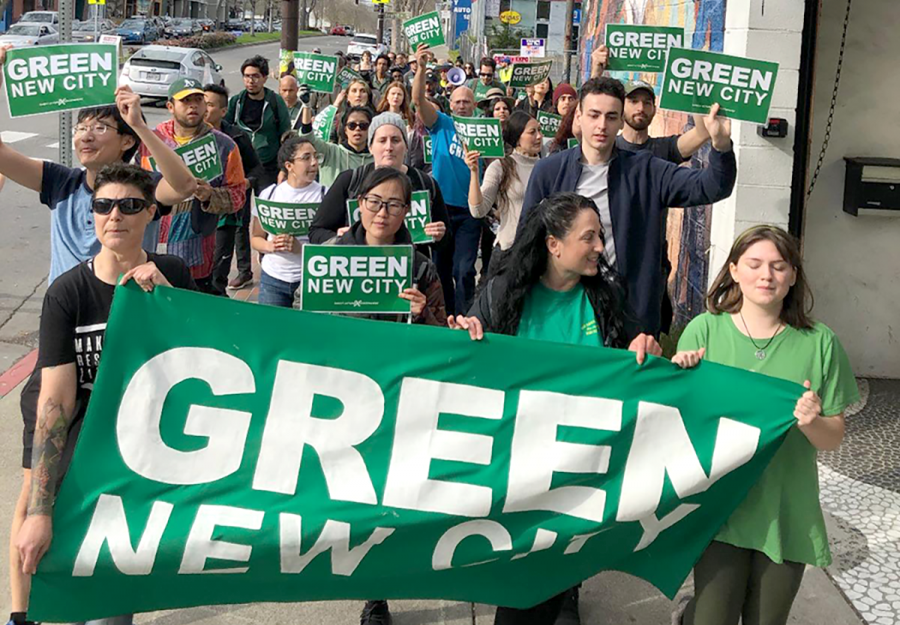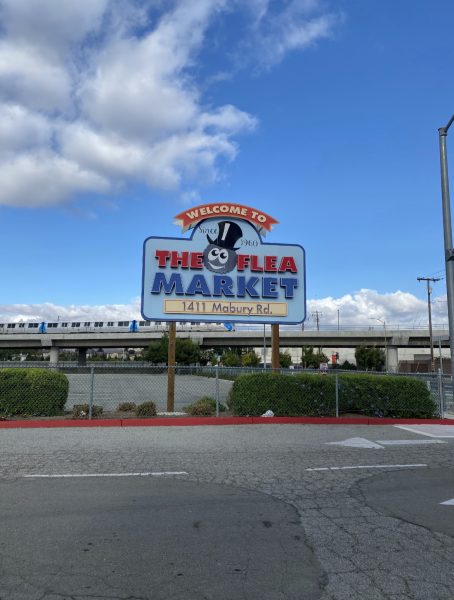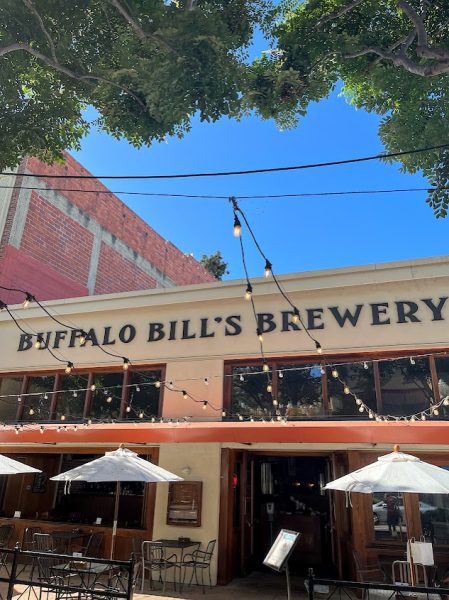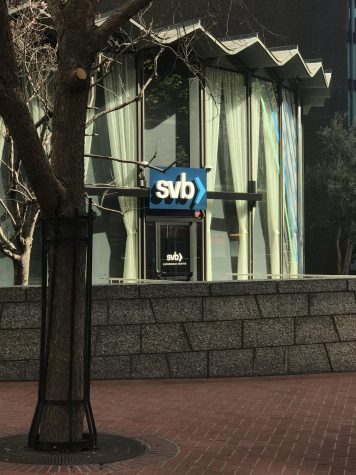Direct Action Everywhere
May 1, 2020
Bay Area Founded Animal Rights Social Movement
Direct Action Everywhere, abbreviated as DXE, is a community based social campaign group that organizes protests in support of animal advocacy. Since its establishment in 2013, DXE has grown vastly, including opening up a U.K. branch, which is referred to as a “chapter”. Interviewed were two members of the protest working group of the Bay Area, Berkeley DXE chapter.
“[The] dx in math is the symbol for the rate of change, indicating that we desire significant political and revolutionary change in a short rate of time. X is also a placeholder, representing the diverse backgrounds and ideologies that embody our campaign,” Mathew Mckeefry, a five-year DXE member of the UK chapter explains.
“DXE is an international grassroots animal rights network that uses non-violent direct action to create revolutionary social and political change for animals.”
Mckeefry has been involved in activism since he was 11, now filling the much more prominent role of DXE organizer or team lead of protest organizing at the Berkeley branch.
“My activism when I was 11 looks very different to what I’m doing now. I was involved in a direct action environmental organization, fundraising and handing out leaflets,” recounts Mckeefry. “I got involved in the environmental movement because I wanted to stop the killing of non-human animals. Moving forward, I learned about speciesism, which led me to DXE.”
Though DXE consistently protests and demonstrates about animal rights issues, their activism often plays a role in furthering the social causes of others.
“Recently, we did a march where the animal rights, housing, and environmental justice movements all intersected. We marched from Golden Gate Field, which is a horse racing track, to Berkeley City Hall,” Mckeefry recalls “There’s a housing encampment near the Golden Gate field, where we cleaned up trash and supplied them with plant-based food. Berkely city isn’t cleaning up trash. We want to close golden gate fields and turn it into housing.”
At the march, two documentary members, a French TV company, and press from the Daily Cal attended. When asked what the best tactics were for gaining media coverage for your social campaign, Mckeefry said “Be disruptive, challenge the status quo, and be sustained. We need sustained campaigns rather than one-off protests.”
In our recent political climate, and beginning at the start of presidential campaigning in the 2016 term, DXE made every effort to be vocal about the importance of their “Let Dairy Die” campaign.
Diana Navon, another member of the DXE for the past 3.5 years and a working member of the protest working group, recalled that one senior experienced member at a local Bernie rally “got onstage and took the microphone from Bernie, at which point he tried to grab it back.
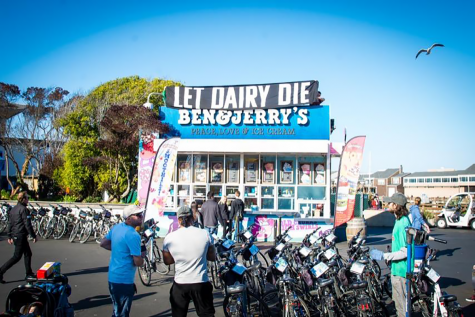
She then grabbed another microphone and said, Bernie, I am one of your biggest fans, but why are you supporting dairy? At that point, three more activists, topless with red paint on their breasts to represent animal blood. They were arrested and spent the night in jail. Bernie is disavowing their current prosecution.”
At another protest, she said “In this case, we were not able to get on the stage, but some of us were able to run past the stage and were seen on camera. Two took their shirts off, and we were going to unfurl a Let Dairy Die banner.
It was a really cool rally. The cops were very nice.” Matthew also informed the Pioneer of one LA Biden rally disruption, when three activists got on stage right beside Joe Biden and were tacked to the ground, topless.
Both Mckeefry and Navon are Bernie supporters, and both stressed the importance of being able to vocalize their beliefs and opinions about the Dairy industry at a public rally.
Mckeefry explains, in response to the idea of some seemingly puzzled Bernie supporters, “I am a big Bernie supporter too, but that doesn’t mean he should be immune to criticism. Bernie is all about advocating for voices that are silenced, and giving people a voice in politics, but he is ignoring the dairy industry and injustice against animals. He is giving a lot of money to the dairy industry.”
When asked if Bernie was aware of their campaign, Mckeefry said “his campaign reached out in 2016 asking for policy recommendations during those periods of rallies and disruptions. At one point, one of his campaign managers contacted us, but there were no real results after that initial communication”.
Marking significant events such as political rallies with the message of your own political voice is a powerful method of speaking your mind and using the resources that you have at your disposal, a method that DXE employs all the time, and as their central method of action. It is a group in which individuals join to further social change for their own social and political interest with the belief and goal in mind of benefiting everyone.
“When I first started going, it was such a wonderful feeling to have a place where I could be with other people that are compassionate or understood that those animals need to be advocated for. Like coming in out of the cold” said Navon. She respects that DXE upholds MLKs ideas of nonviolence, saying “there is no way that a social movement will ever be successful with social violence”.
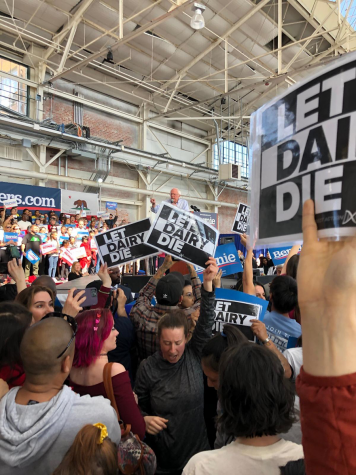
Though they are a non-violent protest group, DXE sometimes pushes legal boundaries in order to facilitate animal rescue missions or to obtain media coverage in a publicity situation. “I got arrested and went to jail three times. The first time, we refused to leave until a slaughterhouse released all their animals to us. The charges were dropped.” Navon continues. “The second time, I was arrested for being on federal land without a permit. The last time, we went into a so-called humane farm, wearing special anti-pathogen clothes and taking special formula baths so as to avoid spreading pathogens.”
“We all went into different barns. I was able to rescue a bird. They were so sick that they would have died before they went to slaughter because they were so neglected. We spent the night in jail, about 40 of us.”
These are just a few tales in summation of the injustice inflicted upon an animal which we see as food or resource.
Navon said that at first the size of the Berkeley DXE chapter was manageable, but it became so large that it was difficult for it to be inclusive of all members, socially speaking. “We had to organize into what we call circles, in order to bond and become friends with each other because we understand the importance of relationships in social movements. People get involved in social movements but don’t stick it out because they become alienated with the crowdedness,” explained Navon.
Mckeefry adds, “The reason that we started circles is so that everyone feels that they have a home in DXC. Once a community reaches around 150 members, it reaches its maximum social connection management capability, so in order to continue facilitating good communication, circles were created.”
“Especially now, in 2020, with the rise of the far-right and pandemics, as activists we must continue to stand up and speak out,” Mckeefry says. “We can’t be silent on issues about justice, we must make sure that we are vocal and taking action. Not only discussing within our own circles but taking it to the street and disrupting the system.”




